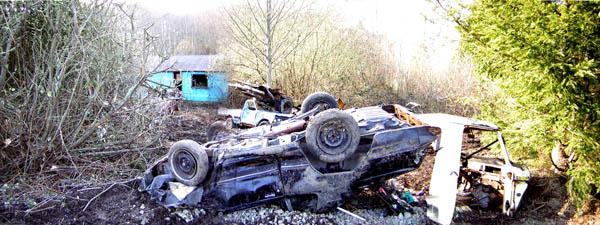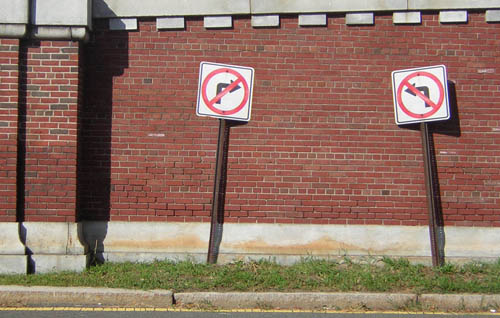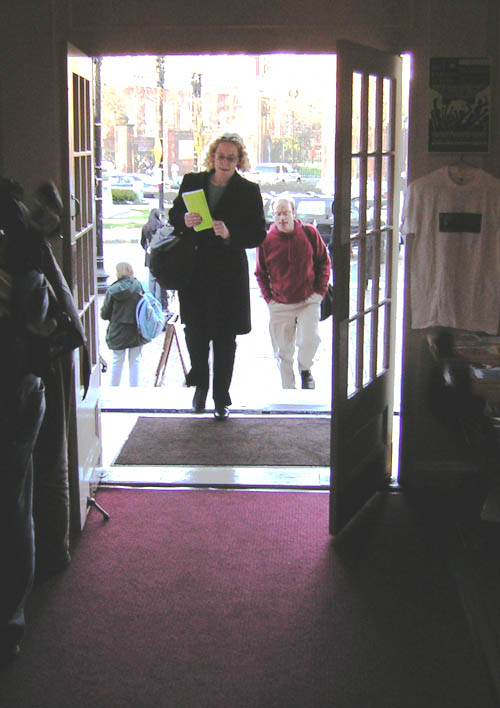Tue 9 Oct 2007
Beyond Inconvenient: The Truth Al Gore’s Not Telling You – Part II
Posted by Adam under UncategorizedNo Comments
Thanks, Mr. Clinton, but It’s Not the Economy!

Alas, We Can’t Go On Living This Way
The end is inevitable: our glut of cars, our thriftless air travel, our food shipped thousands of miles, our single-family houses and strip malls, our endless electronic gadgets, our toxic lawns, our monocropped farms. Exporting damage to our own impoverished communities and to third-world countries, whether it’s in the form of pollution, resource depletion or the chronically unconscionable exploitation of human beings (1), is over.
The Earth cannot support such depletion and waste, and all of our rationalizations about “balancing” the environment and the economy are mere jabberings before the laws of nature, which always – absolutely always – prevail.
Our Climate Crusaders’ Unthinkable Thoughts
Why won’t global warming “thought leaders” tell us the extent of the crisis into which we have already plunged?
Perhaps it’s because such a permanent and far-reaching shift of gears is not in the category of what Noam Chomsky has called “thinkable thoughts” (2). Those of us who are on-the-ground global warming organizers routinely witness “concerned” people with “good” intentions replacing lightbulbs while the plasma TV babbles tripe to empty chairs, buying Priuses and driving more because it’s now fuel efficient to do so, flying thousands of miles across continents and oceans to conferences for good causes with stars and other important people, healthfully eating fish to extinction, using biofuels and destroying endless acres of farmland and tropical forest – the list of absurd and paradoxical behaviors is interminable.
The thought of life without what we take for granted is not a thinkable thought, which may be why Gore et al. can’t or won’t tell us about it. It may be why the mainstream media is doing such a miserable (but mildly improving) job covering climate change, the most important and compelling story in modern human history. But if we are to be serious about addressing the catastrophic effects of global warming (and to date that’s a questionable “if”) we need a massive and urgent change of consciousness, and an effort reminiscent of – but far more profound and permanent than – World War II’s Victory Gardens, rationing and Manhattan Project.
The surprise is that living differently could be a major improvement in our American lives, and in the lives of human beings and countless other species across the planet (3).

Can We Think Beyond the Boundaries of the Thinkable?
What’s currently confusing is that for most of us in the United States things still look more or less normal. So far the big disasters are mostly happening elsewhere in the world – a six-year drought in Australia’s breadbasket, chronic flooding and retreat of shorelines in Bangladesh, drying of the Amazon, shrinking of the glaciers at the poles and in the mountains of the tropics, growing unavailability of fresh water, and so forth.
Here in the United States there have been hurricane Katrina, wildfires raging across the country, persistent and growing drought, floods and torrential storms on the rise. Nonetheless on the whole we still have a dazzling selection of foods in the supermarket, there’s gas for our cars (mounting price and oil company profits notwithstanding), and many of us still have jobs with which to chase our credit card debt. In our news media critical weather events are only sporadically connected with global warming, which is more often than not discussed in the future tense. The climate is not a problem obvious enough to interfere with more immediate pleasures.
How are we to comprehend and embrace our unthinkable: the twenty-first century innocently normal is lethal. The ski trip to the mountains, the steak dinner, the vacation flight to Paris, the exotic (or even not-so-exotic) wood furniture, the up-and-coming biofuels, the big plasma TVs, the instant-on appliances, the family car (even if it’s a hybrid).
As Ronald Wright points out in his insightful and eminently readable book, A Short History of Progress (4), civilizations since the beginning of history have found themselves ensnared in “progress traps,” where ecosystems are destroyed beyond repair (that is, destroyed in a human timeframe – nature recovers eventually, as long as the sun shines). The inevitable consequence is collapse. In the past, there was always somewhere else on the planet to go. No more.
Despite an understandable reluctance to acknowledge what we’ve done to our remarkable Earth, we’ve got to fix it no matter the economic costs(5). But without knowing the truth in all its ramifications we will not be able to act on it.
You know the truth, Al. Why don’t you tell us?

Next time: What Does Our Globally-Warmed Life Look Like?
Copyright 2007 by Adam D. Sacks, all rights reserved.
1. There is, of course, a long and sordid history of damage wrought by western colonialism. Such damage may take many forms other than obvious adventures like the U.S. war in Iraq. For a current example, see “Western Consumption May Cause Famines,” Anita Purcell-Sjoelund, Agence France-Presse, July 1, 2007, http://www.truthout.org/issues_06/070207EC.shtml.
2. Edward S. Herman and Noam Chomsky, Manufacturing Consent : The Political Economy of the Mass Media , (New York: Pantheon Books, 1988), cited by Timothy Weiskel in ” Selling Pigeons in the Temple: The Danger of Market Metaphors in an Ecosystem,” 1997, http://ecoethics.net/ops/ops-008.htm.
3. There are a numerous websites and books on moving towards a carbon-free age. Here are a few for getting started: The Community Solution, http://www.communitysolution.org; Transition Culture, http://transitionculture.org; E.F. Schumacher Institute, http://smallisbeautiful.org; The Low-Carbon Diet, http://www.empowermentinstitute.net/lcd/; Deep Economy, by Bill McKibben; The Natural Step for Communities by Sarah James and Torbjörn Lahti.
4. Ronald Wright, A Short History of Progress, Carroll & Graf, NY, 2005. Also on the civilization survival reading list is Jared Diamond’s remarkable work, Collapse, Viking, NY, 2005.
5. Leading Indian physicist and activist Vandana Shiva frequently explains, with her trenchant clarity, all that we’re not supposed to see in order to feed the beast. Here’s one recent article of hers: http://www.alternet.org/story/63541/.
Leave a Reply
You must be logged in to post a comment.